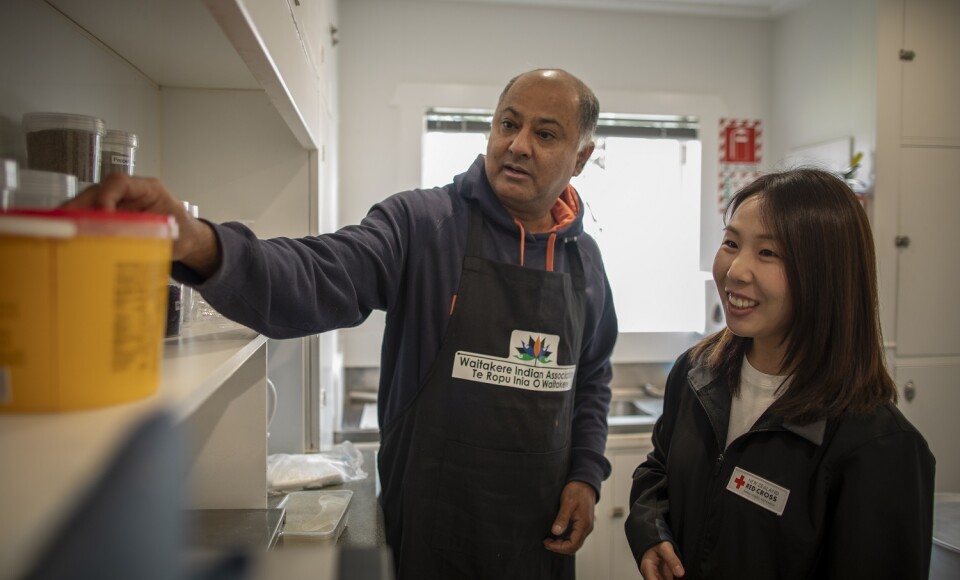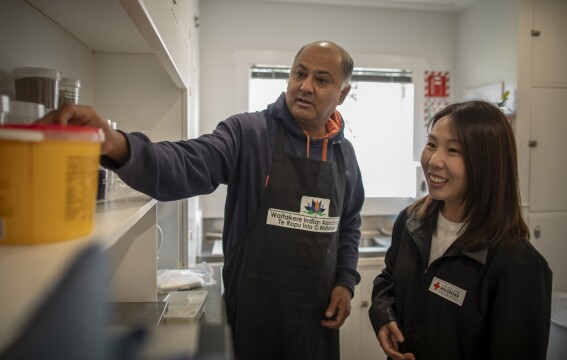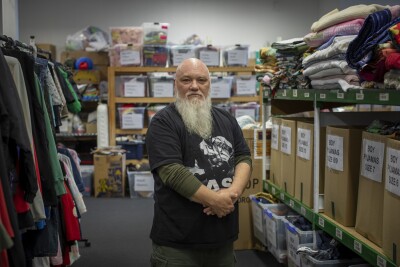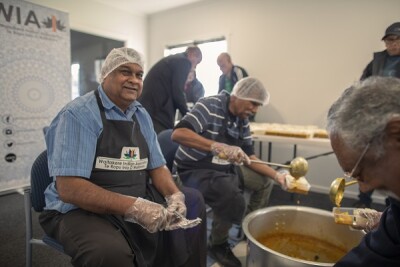Lending a hand in Tāmaki Makaurau Auckland
27 July 2023


Fortnightly update 11: Lending a hand in Tāmaki Makaurau Auckland
More than half the New Zealand Disaster Fund has now been committed to helping people and communities. This fortnight, we focus on our support in Tāmaki Makaurau Auckland.
We have now committed a total of $15.6 million to help communities respond, recover and prepare for the future. In Tāmaki Makaurau Auckland, New Zealand Disaster Fund grants have supported a variety of community organisations that are helping people affected by the floods. This includes groups that are providing essential winter items for families, delivering food to affected households, and supporting recovery in west coast beach communities after Cyclone Gabrielle.
Upcoming mental health workshops
We’re working with the Tāmaki Makaurau Recovery Coordination Office to present a series of mental health workshops for people affected by flooding in the Tāmaki Makaurau Auckland area. Course costs are covered by the New Zealand Disaster Fund.
Recovery Matters workshops will be held on 5, 12 and 27 August. Participants will learn about managing their own feelings and understanding responses of others after a disaster, unpack the science of stress, and learn practical tips and tools to help themselves and others through the recovery process.
Sign up to a Recovery Matters session
Psychological First Aid in Disasters courses will be held on 16 and 17 August, and 12 September. This course is for anyone providing support to those affected by the floods or Cyclone Gabrielle. Psychological First Aid is a method of helping people in distress, so they feel calm and supported in coping with their challenges.
Sign up to a Psychological First Aid in Disasters workshop
Winter made warmer by grant
“The Red Cross grant was a huge gap filler,” says Bernie Harfleet, co-founder of Give a Kid a Blanket.
The West Auckland charity supplies blankets and other essentials to people in need. Bernie says this has been a tough time for West Auckland with many still recovering from the effects of the flooding earlier this year. Meanwhile, donations to Give a Kid a Blanket have dwindled, making it difficult to meet the demand.

Give a Kid a Blanket’s Bernie Harfleet in the organisation’s warehouse in Henderson
The team’s work was boosted last month by a $30,000 grant from the New Zealand Disaster Fund. The grant has been used to support people in need after the flooding with warm clothing, bedding, and sometimes food and toiletries.
“A huge sector of our community was terribly affected and that $30,000 was fantastic. It helped a whole lot of families and individuals over the winter. It allowed us to buy duvets, beanies, socks, pyjamas, hot water bottles, warm clothing, duvet covers and pillows. That all adds up pretty fast,” says Bernie.
Food made with love
Waitakere Indian Association are known for their heart-warming meals, which have served as a lifeline to many Tāmaki Makaurau Auckland families suffering the effects of this year’s severe weather events.
Normally their Massey kitchen cooks 250 hot meals for distribution into the community once a week. When the cyclone hit, they started cooking every day.

Members of the Waitakere Indian Association cook and pack meals for distribution
“We came together as one to use our different skills,” says Sunil Kaushal, president of Waitakere Indian Association – Te Ropu Inia O Waitakere. “Our volunteers have given hours and hours of labour out of love to serve our community. Working in collaboration to make sure no one sleeps hungry.”
Their efforts were boosted by $21,000 from the New Zealand Disaster Fund to cover essential items like ingredients, which helped them continue to support the worst-affected families.
“It means a lot to us and to the recipients,” says Sunil. “These floods and cyclones have taught us the importance of community and working together. Even $5 or $10 makes a huge difference to a family in need.”
Supporting west coast communities
Auckland’s west coast is famous for its dramatic scenery. However, for local residents, this rugged landscape has become something of a double-edged sword. Many roads in the area were cut off for months after Cyclone Gabrielle and many are still vulnerable to landslips in heavy rain, making recovery very challenging.
The New Zealand Disaster Fund has provided several grants to the west coast communities of Muriwai, Piha, and Karekare to help support residents manage life after the cyclone.
In Piha, a $39,000 grant helped restore the water supply to homes in the northern end of the town after weeks without running water. The grant was also used to repair the preschool so it could re-open, which resident Jenene Crossan says was crucial. “Parents were having to reorganise their lives to get their kids to an alternative preschool,” she says. This was taking up to an hour and a half with detours due to closed roads and added stress, cost, and lost time away from work for families already coping with immense challenges.
Access to electricity was also a major challenge for these west coast communities. Some areas lost power for weeks after the cyclone, and there have been intermittent power cuts in the months since. The New Zealand Disaster Fund has made grants to local emergency hubs for generators so that communities can use these when needed.
New Zealand Red Cross has also provided funding to get extra support to struggling households – especially those with red or yellow stickered homes. This included a $50,000 grant to Muriwai Community Recovery Charitable Trust. Board member Erin Griffin says red-stickered homeowners face mounting costs, especially for interim accommodation. “It’s a little bit of assistance, but it means a lot, it means people care,” says Erin.
Kia Kaha Karekare has also received a $50,000 grant, the majority of which will go towards support for families whose homes have been red and yellow stickered. In Piha, the Piha Ratepayers and Residents Association received a $50,000 grant and has also been offering payments to those with damaged homes to help with personal costs. “I saw that the grants gave people a glimmer of hope,” says Jenene. “There are a lot of people who will be dealing with the ramifications of the cyclone for years, and it will completely alter the path of their life. There’s stress upon stress. So it’s epically important – it feels like a little bit of hope.”
Information hubs in Tāmaki Makaurau Auckland
Over the last two weeks, we’ve been supporting Auckland Council’s community drop-in sessions for storm-affected property owners. These pop-up hubs are designed to help people understand the process that is in place to reach a final categorisation of their home.
These are complex and difficult discussions for many homeowners, and our staff and Disaster Welfare and Support Team members have been on hand to offer psychosocial and general support.
This round of pop-up hubs has ended, but additional sessions may be added in future. Read more here: Pop-up info hubs for flood-affected homeowners
New Zealand Disaster Fund closure
The New Zealand Disaster Fund will be closing to new donations at 5pm on 6 August 2023. A huge thank you to everyone who gave so generously to the Fund. Your support has made our work possible and is making an immense difference for communities affected by the cyclone and severe weather events.
In our next fortnightly update, we'll provide an overview of how we'll be distributing the remaining funds.
People can still support our ongoing emergency management work across Aotearoa by donating to our Where the Need is Greatest fund.
By the numbers
The New Zealand Disaster Fund is being allocated across three programmes of work:
- The Response and Recovery Programme supported our immediate emergency response on the ground and is now helping communities recover by providing goods, services, and people. At this stage, approximately $8 million has been budgeted for this programme, including approximately $7 million for Home Bundles.
- The Partnership Grants Programme provides grants to community organisations supporting community response and recovery. At this stage, approximately $13 million has been budgeted for this programme.
- The Investment programme is focused on helping communities prepare for, respond to, and recover from future emergencies and disasters. At this stage, approximately $6 million has been budgeted for this programme.
The amounts budgeted for each programme may go up or down as needs change.
Total committed funds across all programmes: $15.6 million
Total donations: $27 million
Note: Figures provided are as accurate as possible as at 26 July given the rapid nature of grant allocation. Figures may change slightly in our annual reporting as we complete our audit process.
Partnership Grants Programme
This programme distributes grants to community organisations that are helping those affected. Supporting these organisations helps make sure response and recovery work is community-led and meets local needs.
Total approximate spent or committed: $12 million
Total Community Support Grants approved: 106 grants
Total Community Enable Grants approved: 60 grants
Total grant applications received: 283
Approximate programme budget: $13 million
We are continuing assessments of existing grant applications. Entities supported recently include:
- Kia Kaha Karekare – food and petrol vouchers for households with red and yellow stickered properties, funding for school and community hub – $50,000
- Tāmaki Ki Te Tonga Māori Wardens Association – food parcels, household care packs, personal hygiene kits – $40,000
- The Evergreen Foundation – Clean up assistance and psychological support in rural areas – $100,000
Some grants approved in this fortnight do not appear in this list as the recipient has yet to be notified.
See the full list of entities we've supported so far
Response and Recovery Programme
This programme supported our immediate emergency response on the ground and is helping communities recover by providing goods, services, and people. It is now focused on rolling out Red Cross Home Bundles.
Total approximate spent or committed: $3.5 million
Approximate programme budget: $8 million
Red Cross Home Bundles programme: Supplying new basic furnishings and household items to eligible households in need identified by our delivery partners. The programme was piloted in Te Karaka, near Gisborne, and has now been extended into Tologa Bay, Wairoa and Auckland. It will be rolled out into other affected areas in the coming weeks, but will take months to complete as people wait to move back into their homes.
Learn more about Red Cross Home Bundles programme
Red Cross response: Disaster Welfare and Support Team travel and equipment to support local Civil Defence Emergency Management Group requirements. Free Psychological First Aid training to 617 people in 49 courses.
Equipment: Includes generators, dehumidifiers, clean-up kits, first aid kits and other items relating to emergency accommodation and other community needs.
See a breakdown of our spending under the Response and Recovery programme to date
Investment Programme
This programme will provide funding to help communities prepare for, respond to, and recover from future emergencies and disasters as the impacts of climate change grow.
Total approximate spent or committed $-
Approximate programme budget: $6 million
Learn more
We’ve been around for more than 100 years. As the impacts of climate change increase the frequency and severity of weather-related emergencies across the country, we’ll keep being here.
The New Zealand Disaster Fund helps us to support communities to respond to, recover from, and prepare for disasters and emergencies in Aotearoa New Zealand.
If you want to stay up-to-date on how the New Zealand Disaster Fund is making a difference you can register for email updates.
Sign up for regular updates about the New Zealand Disaster Fund (redcross.org.nz)
Practical support and information to help you care for yourself and others after the recent flooding and Cyclone Gabrielle.
Caring for yourself and others after an emergency or disaster
Volunteer with us
We can’t do our work without the thousands of Kiwis from all corners of Aotearoa New Zealand who give their time and energy to volunteer.
We’re always on the lookout for dedicated people to join us in our humanitarian work. Join over 8,000 other humanitarians in New Zealand and volunteer today.
Find a volunteer role near you
Red Cross in your community
New Zealand Red Cross is part of your community. We have 16 offices around New Zealand including our head office in Wellington. You can join your local branch, group in over 40 cities and towns around New Zealand, or shop at one of our 50 retail stores.
New Zealand Red Cross has 15 ‘areas’ across the country. Each area has its own area council, which is elected by the local Red Cross members.
There are nearly 50 branches of New Zealand Red Cross around the country. Branches have a hands-on local-community focus, and are run by volunteers.
Find out more about what we do in New Zealand
Support our work
Our emergency management work is funded through the generosity of donors.
Donate to New Zealand Disaster Fund
Related stories
- $10 million in grants made from the New Zealand Disaster Fund
- Spreading kindness through the New Zealand Disaster Fund
- One Voice amplified by funding support
- $1 million grant to Hawke’s Bay Disaster Relief Trust from New Zealand Disaster Fund
- How our Red Cross Shops are helping after Cyclone Gabrielle
- New Zealand Disaster Fund reaches $15 million
- Psychological First Aid courses provide wellbeing support after Cyclone Gabrielle
- Delivering generators in the Far North
- Preparing for and responding to Cyclone Gabrielle
- See all stories related to the northern floods and Cyclone Gabrielle response and recovery
Lead photo: Sunil Kaushal of the Waitakere Indian Association shows Red Cross co-ordinator Joan Lee where meals are prepared.